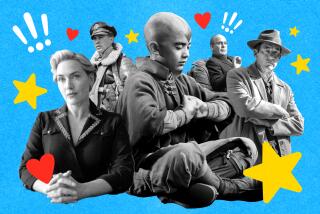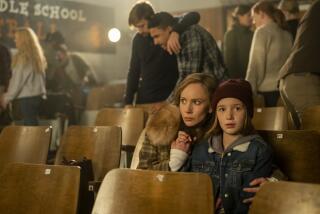TV Picks: ‘The Returned,’ ‘The Graduates,’ Welles’ ‘War,’ ‘Dracula’
“The Returned” (Sundance Channel, Thursdays). A French miniseries in eight parts, based on a 2004 film of the same French name (“Les Revenants”) but a different English one (“They Came Back”). The word “zombie” is often mentioned in press for the series, in which several characters, deceased, of different ages and dates of death, return to a small French mountain town -- confused but, unlike your average zombie, with their mental faculties intact and physically none the worse for wear. (They are better off, in fact, being not dead, or undead, and bodily whole.) It is not a zombie story at all, as we understand the term. Or not yet -- I am about halfway through the episodes as I write this. Though much has been established, nothing has been explained -- and I fear the explanation, in a way, as much as the bad things that may happen before we get there, for the series comes alive in the uncanny and inexplicable, and answers are just things writers make up. I will have seen it all by the time I write my full review, timed to Thursday’s premiere, but as there is a second season scheduled for next year, we may be headed toward a conclusion or a cliffhanger. (I won’t say which, when I know.) What makes the show so extraordinary -- it’s certainly one of the great series of the fall, and the year -- is that it creates tension with so little recourse (so far, at least) to the horror bag of tricks; it is less interested in magic than in human relations: The apprehension and suspense come not from anticipating the sudden shocks that a thousand scary movies have taught you are coming -- you do get a few -- but from wanting things to go well for decent people caught up in something big and strange, and feeling they well may not. The atmospheric music is by the Scottish post-rock band Mogwai.
FALL TV 2013: Watch the trailers
“American Experience: War of the Worlds” (PBS, Tuesday). Orson Welles’ October 30, 1938, broadcast version of H.G. Wells’ 1898 Martian-invasion novel -- “The Mercury Theatre’s own radio version of dressing up in a sheet and jumping out of a bush and saying ‘Boo!,’” as he added at the broadcast’s close, when reports of actual panic were already flooding in -- is recalled. This is how things went viral back in the days when telephones had cords and cameras shot film and moving pictures only moved at the movies -- a radio culture that filled the mind with pictures. As many as a million people, set off by a drama made to sound like real breaking news -- including an FDR sound-alike (introduced, disingenuously, as the secretary of the Interior) -- are believed to have believed that Earth was under attack from the Red Planet that night and acted accordingly. (The comments of real citizens are performed by actors, dressed up and shot in black and white as if speaking for a contemporary documentary -- faking it for a story of faking it.) There were enough cues, if one missed Welles’ introduction and were in a pliable state of mind, to regard the end as nigh, especially given years of radio-reported Depression and disaster and a nation conscious of being on the brink of being on the brink of war. The film, which traces the event from inception through messy-then-triumphant aftermath -- it is suggested that “War” is what made “Citizen Kane” possible -- efficiently sketches the artistic, social and psycho-biological context. (Foolish humans! We have met the enemy and it is the autonomic nervous system, apparently.) Oliver Platt, a distant relative of Welles who favors him a bit, narrates.
PHOTOS: Hollywood Backlot moments
“The Graduates” (PBS, Mondays). Almost more PSA than report, this two-part portrait of Latino youth at a crossroads is meant to be inspirational and inspiring, and is. Presented as part of the series “Independent Lens,” it’s both a pitch to kids to stay in school -- Latinos have a high dropout rate -- and a plea (indirect but unmistakable) to everyone else to support institutions that support kids, not just school but any outreach program that can make life less risky for those at risk. Part one focuses on three girls, part two on three boys, each representing a different city and challenge; covered ground includes immigration, sexual identity, gangs, teenage pregnancy and homelessness. Both segments feature educators and public figures speaking to the importance of learning and self-acceptance. All speak straight to the camera, which is to say, to you. The emphasis throughout is personal, and the subjects excellent company.
“Dracula” (NBC, Fridays). Long on visual splendor, with a curlicued Budapest standing in for sober-sided Victorian London, this Anglo-American limited series has a thing or two to do with the Bram Stoker original, and many more things that don’t. Here, old Vlad comes masquerading as an American industrialist, pitching free energy -- this may well be the first vampire film to name check Nikola Tesla -- and harboring a righteous cause: to take down the centuries-old secret society that killed his wife, back in the Romanian Dark Ages. Mina Murray (Jessica de Gouw) is a medical student now, because we’re living in 2013 even if these characters aren’t, Jonathan Harker (Oliver Jackson-Cohen) a journalist and Renfield (Nonso Anozie) no bug-eating loony but a capable sidekick, valet and social secretary; new to the mix is Lady Jayne (Victoria Smurfit), a busty blond vampire killer with mad fighting skills and a cinched-waist steampunk wardrobe. (Someone has seen “Blade.”) Jonathan Rhys Meyers, clearly born to play undead, is the title bloodsucker. For all that it seems to court disaster, the series does its comic-book business with aplomb; its occasional grappling with seriousness doesn’t obscure the fun, and the fun rarely collapses into silliness. There will be blood, along with genre-customary sexual situations. The usual warnings apply.
ALSO:
Watch: Sarah Silverman’s unsold NBC pilot, ‘Susan: 313’
USA network renews legal drama ‘Suits’ for fourth season
NBC to revive classic drama ‘Murder, She Wrote’ with Octavia Spencer
More to Read
The complete guide to home viewing
Get Screen Gab for everything about the TV shows and streaming movies everyone’s talking about.
You may occasionally receive promotional content from the Los Angeles Times.







